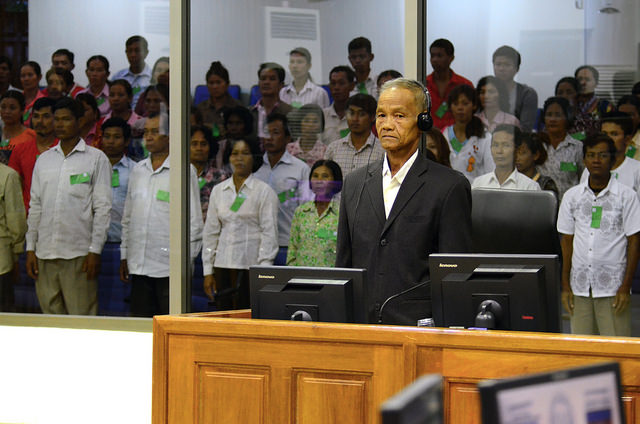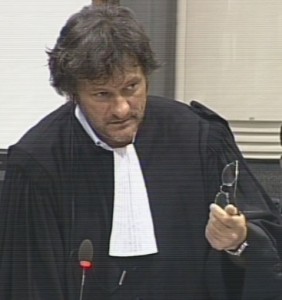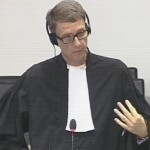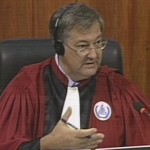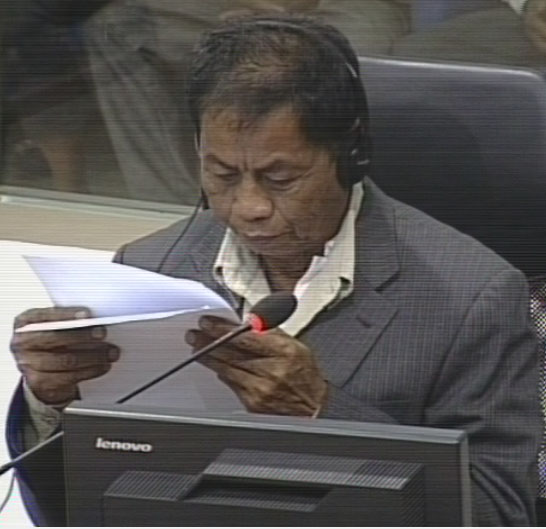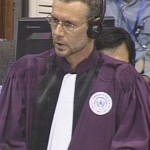“I wanted to liberate the population. Instead, I did the exact opposite.”- Witness
Today, on June 23, the court finished the cross-examination of witness Mr. Sem Hoeun [1] and started hearing the testimony of witness Mr. Him Hân (ហ៊ីម ហន), 66.
The court also published this 14 minute video explaining this part of the case—case 002/02– which you can see above. The Court is currently hearing witness on the Kampong Chhnang Airport Worksite.
__
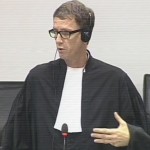
Mr. Victor Koppe, defense counsel for Nuon Chea — (all subsequent pictures courtesy of Kim Sovanndany from DC-Cam)
Mr. Victor Koppe, defense counsel for Nuon Chea, continued his cross-examination of witness Mr. Hoeun from the day before. He would give the floor to his colleague from the Khieu Samphan defense team, Mr. Vercken, and then resume his cross-examination when Mr. Vercken was finished.
Alleged Coup
Mr. Hoeun confirmed that the “ultimate aim,” of the plan was “to conduct a coup d’état” against the DK.
One of the steps of the plan according to Mr. Hoeun was to occupy the Stoeng Meanchey Radio Station, which, according to him, was at that time, the official main broadcast of the regime that extended to all provinces of the country.
He said that the forces that were being organized by Ta Oeun (Division 310 commander) to overthrow the regime were called the Khmer White, but he did not know why they were called that way. He also said that he only heard about the Khmer White after 1977 and confirmed that the East Zone forces were part of the Khmer White.
Mr. Hoeun did not have any detailed knowledge as to who was supposed to take over and replace the DK, as he was “simply a combatant.”
__
Mr. Arthur Vercken, defense counsel for Khieu Samphan (who arrived yesterday to take the baton from Anta Guissé), then took the floor.
Visit of Khieu Samphan
Through the questioning of Mr. Vercken, Mr. Hoeun changed his testimony from the day before and said that he had not recognized Khieu Samphan when he visited the Kampong Chhnang worksite but had only been told that it was him.
Alleged Coup
Mr. Hoeun also said that the suspicions against him started in 1975. He also said that he would carry out undercover mission, like going to the Pochentong Airport at night “to observe the situation there” for which he would be given weapons. These mission he said, were in preparation for the coup.
Mr. Hoeun said he also hatched the plan for the coup since 1975 with the division chief, Ta Oeun.
Ta Oeun “ had a plan and he disseminated it through the battalion so that soldiers in the battalion could rise up and overthrow the DK,” Mr. Hoeun said.
Mr. Hoeun again said that, around January 1977, he took weapons from the Division office of 310 near Wat Phnom in 6 trucks and with 36 soldiers to a village in Kampong Cham. These weapons were in preparation for the alleged coup.
Though he was a solider and was standing guard at a radio station in 1975, Mr. Hoeun said he was not armed.
“In 1975 and 1976 weapons were removed form soldiers and kept in the division warehouse,” Mr. Hoeun said.
Security Center near Wat Phnom
It appears that the witness changed his testimony from the day before and said that he had only noticed the security center near Wat Phnom, not a month and half after the “liberation,” but in 1977 after Ta Oeun was arrested.
—
Mr. Koppe, defense lawyer for Nuon Chea, then took the floor again to finish the cross-examination.
Article 19 of the Constitution
Mr. Koppe asked Mr. Hoeun if he knew about Article 19 of the constitution of the DK. Although Mr. Hoeun said he was not aware of it, it is referenced here in full because Koppe kept coming back to the principles stated therein of defending and building the country, to which Mr. Hoeun did testify to.
Chapter Fourteen of the Constitution of DK
– Source DC-Cam
Article 19 The three categories of the Kampuchean Revolutionary Army—regular, regional, and guerrilla—form an army of the people made up of men and women fighters and cadres who are the children of the labourers, peasants, and other Kampuchean working people. They defend the State power of the Kampuchean people and of independent, unified, peaceful, neutral, non-aligned, sovereign, and democratic Kampuchea, which enjoys territorial integrity, and at the same time they help to build a country growing more prosperous every day to improve and develop the people’s standard of living.
Mr. Hoeun said that, although he was not aware of Article 19, soldiers were indoctrinated to defend and build the country and they were instructed to uphold the disciplines and regulations of DK.
Justified accusation of treason?
Mr. Koppe summarizes what Mr. Hoeun has testified about the alleged coup: the secret missions, the transfer of weapons, the plan to attack a radio station and the airport, and the ultimate intention to overthrow the regime and attempts to ask:
“Did you think that the accusations of treason were justified at the time?” Mr. Koppe asks.
The President of the Court, Judge Nil Nonn, intervenes to stop the witness Mr. Hoeun from answering as he is not an expert and cannot give a conclusion.
Leading questions
Mr. Koppe then comes back to Article 19 and mentions that the task of the revolutionary army was to defend and build the army. “Was the construction of the KC airport part of the policy to build and defend the country?” Mr. Koppe asks.
“Personally, I believed the airfield was built with the intentions to defend the country and to defend it in an effective way,” Mr. Hoeun replies.
“Is it fair that your work at the KC airport was part of your normal duties as a solider of the army?” Mr. Koppe continues.
“In general,” Mr. Hoeun replies, “we were part of the RAK. That is my understanding of the nature of the work involved at that particular time.”
Then Mr. Koppe attempts to ask: “Do you agree with me that you were working there as part of your duties, rather than being re-fashioned or tempered?”
Ms. Song Chorvoin, Deputy Co-Prosecutor, objects to this questions as the witness has clearly stated that he was sent there for tempering.
Judge Lavergne rules on the objection and tells Koppe to rephrase the question in the following manner: “For what reason where you sent to the KC airport?”
Mr. Koppe insists that his question is valid as there is a discrepancy, he alleges, between members of Division 310 who were sent to S-21 and those who were sent to KC airport.
Judge Lavergne interrupts him and says:
“I have the impression that we have a matter of misunderstanding…. The chamber has been very clear……. When the chamber says NO it is NO.”
Koppe then “says in that case I’m done,” and sits down.
Pleading by the Prosectuor?
With ten minutes left on the clock, Mr. Koumjian rises to ask the bench to clarify the inconsistences in his testimony and between his statements in the OCIJ statement and his interview with Dc-Cam.
Mr. Vercken and Koppe (who’s heard saying “me too”) strenuously object to this statement as they claim that Mr. Koumjian is pleading and that is “unfortunate that their questions were not specific enough.”
The President rules on the objection immediately and ends the examination of Mr. Hoeun.
—
After lunch, the court started hearing the testimony of Mr. HIM Han (ហ៊ីម ហន), 66. He was born on August 15, 1949 in Turing Ruleang village, Me Pring sub-district, Batheay District, Kampong Cham Province. His father was Him, his mother Kim and they are both deceased. He has 3 children with Moeun, his wife. He is a rice farmer.
Mr. Vincent de Wilde, Senior Assistant Prosecutor, started the examination.
Mr. Han belonged to company 2, battalion 24 (also named 124), regiment 12, of division 310 of the Revolutionary Army of Kampuchea (RAK). After the 17 April of 1975, he became secretary of Regiment 12 in charge of collecting biographies .
Han was the one who compiled the biographies and afterwards would hand them over to Teing (commander of regiment 12) and Sang (commander of battalion 24 or 124).
Mr. Han wasn’t aware of any sorting based on social class that was done on the biographies but later when asked what kind of information was collected and why, he said, according to the translation in English that he was the one who “collected and sorted the biographies,” but he had “no idea which were the good biographies and the bad ones.”
Mr. Han said they just copied the biographies from what was said in the original biographies and that they did not investigate the individual names.
Mr. Han was handed his own biography made on the 8 of May of 1976. He read it out himself.
There it said that he was also known as Ream. That for his living conditions he had 4 plots for rice farming in the dry season and 5 plots of rice farming the rainy season. He had a pair of water buffalo and a tiled roofed house and was an original peasant of the middle class.
The timeline from his biography read as follows:
- -Joined the revolution on 10 of July 1973
- -Joined the youth league in early 1975
- -Became a candidate member of the communist party on 18 may 1975
- -Became a Full rights member on the 11th of January 1976
Meeting at the Olympic Stadium
Mr. Han confirmed that his prior statement in which he had said that had attended a meeting at the Olympic Stadium where he had recognized Pol Pot, Nuon Chea, Khieu Samphan and Ieng Sary.
“At the end of 1975 when I was farming rice in Anlong Krangan,” the statement said, “four people including myself were summoned to attend a meeting to the Olympic stadium… I saw Pol Pot, Nuon Chea, Khieu Samphan and Ieng Sary … I heard Nuon Chea talk of the assignment of soldiers in the central committee with Pol Pot as chief. Regarding in Khieu Samphan and Ieng Sary they did not take the floor.”
Mr. Han then said that Pol Pot only talked a few words but that Nuon Chea spoke at length. He said he knew who it was from the announcement during the meeting, which had mentioned that “first was Pol Pot, second Nuon Chea, third Khieu Samphan, and fourth, Ieng Sary.”
Mr. Han didn’t know if the heads of Division 310 had attended as there were “crowds of people there.”
Mr. de Wilde read from the magazine The Revolutionary Flag (the official gazette of the CPK) which had talked about a meeting on July 22 of 1975 at the Olympic Stadium for 3000 members. Mr. de Wilde read some of the themes that the gazette had reported about such as: the history of the RAK and the reason for and the tasks assigned to it.
Mr. Han did not readily recognize these themes, or the month that was mentioned, but did remember, prompted by Mr. De Wilde that Nuon Chea had said something “to the effect” of how to deal with internal and external enemies.
North Zone Purges
Mr. Han confirmed that the purges of cadres from the North Zone did happen but could not recall the exact date when they happened. He said there was no resistance to the arrests because those who were to be arrested were just called into study sessions and they would not have known they were going to be arrested.
“At the beginning,” Mr. Han said, “the disappearances started in the division, then it moved down to the regiment, and then the battalion level.”
Mr. Han confirmed that it was at a meeting near or at Wat Phnom that cadres from the southwest zone announced over loudspeakers that the General (Oeun), the Deputy chief (Kim) and member (Vun), all of Division 310 had been arrested. After that, Mr. Han said, the cadres from the South West zone gave the orders.
Mr. Han could not remember whether the contents of a confession allegedly made by Oeun were heard over the loudspeakers as the meeting was crowded and noisy.
Mr. Han also did not know anything about a meeting where Oeun had allegedly announced his intentions to overthrow the CPK regime.
He said that after the purges he was sent to unit 17.
Unit 17
Mr. Han confirmed the statement that he had made to DC-Cam where Mr. Han had talked about the creation of Unit 17.
“Unit 17 could be purged and exterminated at any moment because its leaders were the worst of the bad elements.”
“Why could the people for unit 17 be exterminated at any time?” Mr. De Wilde asked.
“They decided that we were traitorous, and there were 50 of us. However I did not know why we were accused of being traitorous. I did not know anything at all of the traitorous activities. “
Conditions at Kampong Chhnang Airport (KC)
“I didn’t dare to refuse [to go work at the Kampong Chhnang Airport (KC)] at all.” Mr. Han said. “I If I dared to refuse, I would be disappeared, he continued, “by that time we were under the control of the South West zone.”
Mr. Han then confirmed that when he was sent to KC he was not a soldier but someone engaging in labor, a worker. But, he said, that they were not sent for “tempering” or “re-fashioning.” He said that they were “screened to do heavy work so that our strength would be weekend so that we could not act against them.”
“At the Kampong Chhnang Airport,” Mr. Han said, “you could say there was freedom, [but] it was limited. We could not walk freely. You could also say that we were imprisoned in a prison without walls.”
Mr. De Wilde read from Han’s DC-Cam interview: “[When] I was transferred to the Kampong Chhnang Airport, life was terrible for everyone. It wasn’t only the population that was concerned. Everyone was doing an uphill task.”
“Why was it so terrible?” Mr. de Wilde asked.
“Allow me to say, said Mr. Han, “We were subject to the heaviest task and we could be executed at any time. We worked for full hours in the morning and full hours in the afternoon and three to four hours of intensive hours at night regardless of weather conditions. That was compounded with insufficient food and lack of sleep and that weakened us.”
Mr. de Wilde finished his examination by reading from a statement Mr. Han had given to DC-Cam: “I acted entirely against my initial objective. I wanted to be a solider. I wanted to fight Lon Nol and liberate the population. Instead I did the exact opposite of what I wanted to do at the beginning. “
“Would it be fair to say,” Mr. De Wilde asked, “that you acted unwillingly for a regime that put the population under a yolk?”
“Yes. That is right. I did not like the regime,” Mr. Han replied.
After clarification questions from Mr. Lor Chunthy, Civil Party Co-Lawyer, the Court adjourned. The cross-examination of this witness will continue tomorrow.
________
[1] His name can also be spelled as Hoeung or Hoeurn–the court didn’t publicly publish his name in Khmer and there is no standardized way to Romanize Khmer script.
